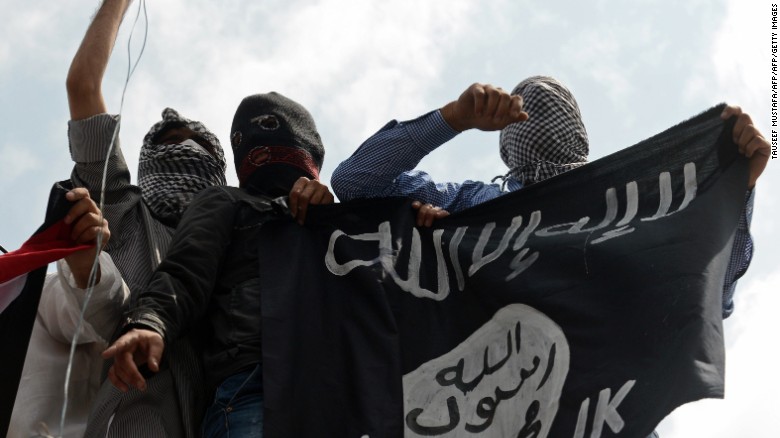ISIS video purportedly shows beheadings of Kurdish fighters in Iraq
A video purportedly from ISIS surfaced online Friday and shows the terrorists beheading four Kurdish Peshmerga fighters in retaliation for the daring raid by U.S.-led coalition forces last week in northern Iraq.
At the end of the 15-minute video, a masked English-speaking man delivers a warning to U.S. President Barack Obama before he executes one of the prisoners, who is wearing an orange jumpsuit.
The three other prisoners are also seen being beheaded at the end of the video and Arabic text appears onscreen. It translates as "Peshmerga soldiers that Americans came down to rescue."
Earlier in the video, ISIS also claims to show the aftermath of the raid during which 70 hostages were rescued by Kurdish, U.S. and Iraqi forces from an ISIS prison in Hawija, in the northern Iraq province of Kirkuk.
"ISIS respects no form of human rights. Our message to them is that we will finish them," said Dindar Zebari, a spokesman for the Kurdistan regional government. "But we have another message for them. We hold 215 ISIS prisoners and we treat them according to international human rights laws.
"We have also freed 85 prisoners who had been suspected of association with ISIS. We do not kill our prisoners."
More than 20 ISIS fighters were killed in the raid and six were captured, the Kurdistan regional government said at the time. There were no Kurds among the hostages, it said.
Some 20 members of the Iraqi Security Forces, local residents and several ISIS fighters accused of spying were among the 70 people freed.
The Kurds are an ethnic group with an autonomous region in northern Iraq. The Kurdish Peshmerga, the military force that protects this region, has been fighting ISIS, which captured parts of Iraq and Syria in an attempt to create what it calls its Islamic caliphate.
The video includes accounts from several people ISIS claims were witnesses to the assault, during which one U.S. soldier was mortally wounded.
Pentagon: 'We're in combat' in Iraq
Earlier this week, ISIS, in an online post, called the raid a failure and said none of the rescued hostages were Peshmerga forces. The raid was called for by the Kurds to rescue captured Peshmerga fighters who were in imminent danger of being executed, officials said.
Masked man
The masked man in the video does not appear to be "Jihadi John," who has appeared in ISIS videos where other captives have been beheaded.
Jihadi John's real name is believed to be Mohammed Emwazi. He was born in Kuwait in 1988 and moved to the United Kingdom in 1994.
Emwazi is a priority target for the United States because he has killed American and other Western and Japanese hostages.
During the summer, unverified news reports suggested he might be on the run from ISIS because his activities put the group in the crosshairs of the world.
But U.S. officials familiar with administration thinking said in July they did not believe that was the case. They said he might have been shifted to other work for ISIS to keep him out of the public spotlight.
Beheadings in Turkey blamed on ISIS
Two Syrian activists were killed in the Turkish town of Urfa, according to two Syrian activist groups and a Turkish official with knowledge of the event.
The groups Raqqa is Being Slaughtered Silently and Eye on Homeland said Ibrahim Abdul Qadir and Faris Humadi were killed by ISIS. The terrorist group did not immediately take credit for the killings.
The two men were shot in the head then beheaded while in their apartment, Reuters reported, citing Abu Ibrahim Raqqawi, the founder of Raqqa is Being Slaughtered Silently.
The Committee to Protect Journalists, which called for an immediate investigation by Turkish authorities, said Qadir and Humadi worked for Eye on Homeland, a Syrian media group that reports on the civil war.
Qadir also worked for Raqqa is Being Slaughtered Silently, where he was one of the founding members of the activist group, which posts online photos, video and information from the Syrian province.
News Courtesy: www.cnn.com











